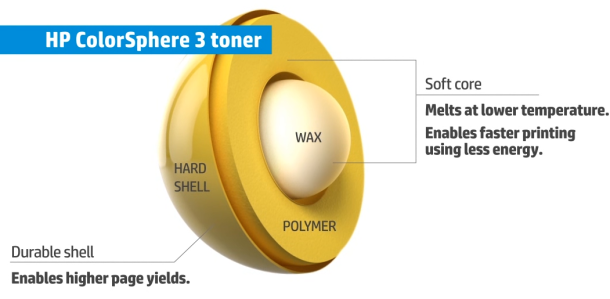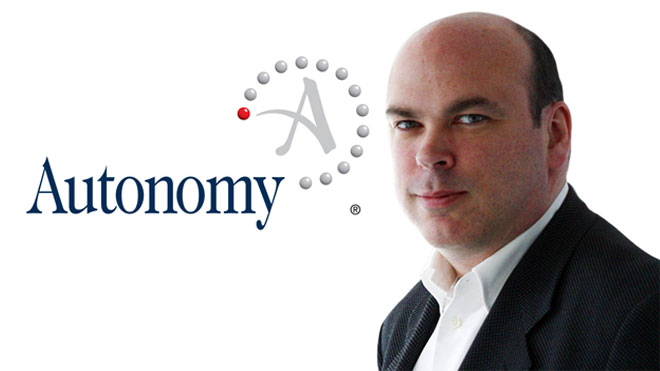Inkjet Wholesale News aims to provide updates on the latest significant occurrences in the field of printing. Whether it’s the launch of a new technology or volatility of market prices, we’ll be here to give you the lowdown on what happened, when it happened, and what it means!
Better Energy Efficiency and Print Speed for HP’s JetIntelligence Cartridges through New Toner Particle
Last month, Inkjet Wholesale announced the introduction of HP’s new line of printers under the JetIntelligence Brand. The introduction of JetIntelligence technology from HP bucked the prevalent trend in the print industry which was on the verge of forgetting what it’s like to introduce ground-breaking new technologies with style and panache.
In other words, HP chose to give such huge treatment to its announcement despite of the prevalent trend in the industry. The reason was that HP had deemed JetIntelligence as a game changer. Many experts in the industry agreed to this assessment. Printers based on the JetIntelligence technology are 53 percent more energy efficient, significantly smaller in size, and quicker with regard to boot time.
However, the most important advantage of JetIntelligence printers is that their cartridges are 33 percent more efficient than conventional cartridges. Now, it has come to light that one of the core reasons why HP’s JetIntelligence printers are ahead of the industry curve is the JetIntelligence cartridges.
The JetIntelligence cartridges have been made better than conventional cartridges through the use of various technologies but the most important one is a new type of toner in them. This new type of toner has been christened ColorSphere 3. How is ColorSphere 3 toner different from conventional toners?
 The toner particles in ColorSphere 3 are softer than conventional toner particles. This increased softness is behind the fact that JetIntelligence printers are more energy efficient. For instance, because these toner particles are softer, less heat is required to melt them onto the paper. Similarly, because of the increased softness of these toner particles, the printer can boot more quickly when compared to older printer falling in the same segment.
The toner particles in ColorSphere 3 are softer than conventional toner particles. This increased softness is behind the fact that JetIntelligence printers are more energy efficient. For instance, because these toner particles are softer, less heat is required to melt them onto the paper. Similarly, because of the increased softness of these toner particles, the printer can boot more quickly when compared to older printer falling in the same segment.
HP faced problems with making softer toner particles for their JetIntelligence cartridges. The foremost problem was that softer toner particles kept getting damaged during the charging process of the JetIntelligence cartridges. However, the solution was to use a special solution that would put a protective layer around each toner particle. This prevented the toner particles from being destroyed by the charging process and the toner being wasted inside the JetIntelligence cartridges.
JetIntelligence cartridges also benefit from a technology called Page Maximiser. According to HP, this technology is basically a redesign of the structure of the toner cartridges. The redesign allowed unnecessary parts of the toner cartridge to be removed. This left more room inside the cartridges. As a result, the JetIntelligence cartridges can hold more ink. This directly improves the number of prints that can be drawn from a single cartridge.
There are other differences between JetIntelligence cartridges and conventional cartridges as well. For example, the JetIntelligence cartridges are free of the pull tab mechanism that conventional HP cartridges have. Resultantly, these JetIntelligence cartridges are easier to install.
The new JetIntelligence technologies such as JetIntelligence cartridges are accompanied by a new monitoring software program from HP. This new reporting tool is called HP Print Gauge. It is capable of the usual task of giving the user a low printer ink warning. However, there’s an added feature which allows the reporting tool to analyse the type of documents being printed. Based on these analyses, the reporting tool can give personalised information on the extent to which all JetIntelligence cartridges have been used.
The JetIntelligence cartridges and printers aren’t all positive news for users though. All the qualities of the JetIntelligence series are based on the use of genuine Original Equipment Manufacturer (OEM) cartridges. To this effect, an anti – fraud technology has been introduced which can detect when generic or non OEM cartridges are used. This same technology can give a warning when someone tries to steal the JetIntelligence cartridges. The silver lining to this cloud is that this anti – fraud technology can be turned off in the settings.
HP On Verge of Settling With Deloitte Before the Autonomy Case Goes To Court
HP has revealed that it is currently in discussion with Deloitte, the British accounting firm, regarding settlement over the Autonomy case. HP had announced in August last year that it would be seeking legal reparation from both Autonomy’s former founders as well the company’s British auditors Deloitte over misrepresentation of accounts.
Before Christmas last year, HP finally initiated a lawsuit against Deloitte over its involvement with Autonomy. However, now, before the case goes to court, both companies have decided to sit down and thrash out an agreement to settle. Simultaneously, HP also decided to sue Mike Lynch and Sushovan Hussain for damages to the tune of $5.1 billion towards damage caused by fudging of accounts.
The decision to make the claim was taken because HP wanted to avoid problems with statutes of limitations. Statutes of limitations may have caused trouble for HP as it limits a plaintiff’s right to file a claim to a certain timeline. Even before HP had made a claim against Lynch and Hussain, it had already reported the senior management of Autonomy to regulators to the regulators of the United Kingdom and US both. The investigation in the UK, handled by the Serious Fraud Office, was closed with the official line being ‘insufficient evidence’. At the same time, jurisdiction for some issues was handed over to parallel investigators across the Atlantic.
In 2011, HP had acquired Autonomy a software company in the United Kingdom for a handsome $11 billion. However, only a year later, HP had to write down the value of Autonomy by half to $5.5 billion. HP stated that it was duped by Mike Lynch and Sushovan Hussain as they fraudulently made their company look more valuable than it actually was.
 Because of the acquisition, HP got sued by its own shareholders for wasting money on acquiring Autonomy. Once the news of HP’s lawsuit against Lynch and Hussain came to the fore, Lynch immediately decided to hit back.
Because of the acquisition, HP got sued by its own shareholders for wasting money on acquiring Autonomy. Once the news of HP’s lawsuit against Lynch and Hussain came to the fore, Lynch immediately decided to hit back.
Lynch categorically stated that he would be suing HP back £100 million as damages for what he dubbed was a smear campaign against him. In addition, Lynch and Hussain have accused HP of mismanaging their company to a point of its devaluation. Lynch and Hussain went on to found a technology fund known as Invoke Capital for $1 billion.
Deloitte seems to be an unwitting participant of a possible fraud committed by the senior management of Autonomy which is possibly why HP is willing to come to a settlement with the UK accountancy firm. Deloitte had, last year, specified that any claim made against it regarding Autonomy’s books would be ‘utterly without merit’ which shows a measure of confidence. Deloitte had even stated that it had handled Autonomy’s accounts within regulations and with complete focus on industry standards.
It is expected that the two giants will come to an agreement well before the Autonomy case reaches court which may result in Deloitte receiving some kind of protection against wrongdoing.
Leave a Reply